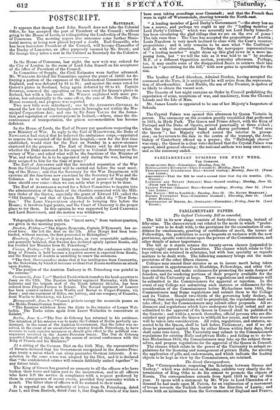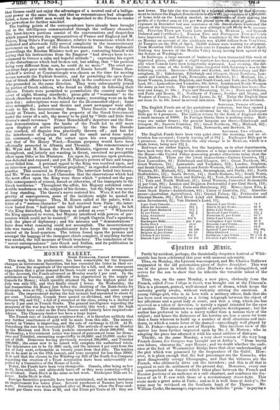PARLIAMENTARY PAPERS.
The Oxford University Bill as amended.
The bill in its new shape consists of forty-three clauses, instead of fifty-nine. The clauses struck out related to the mode in which "prefer- ences" were to be dealt with, to the provisions for the examination of can- didates for emoluments, granting of certificates of merit, the tenure of Fellowships, the prohibition to accept bequests at variance with the new provisions, specific restrictions upon the powers of the Commissioners, and other details of minor importance.
The bill as it stands retains the twenty-seven clauses (expanded to twenty-eight) agreed to in Committee. The clauses which relate to Col- lege reform are retained in substance, but with less specialty as regards matters to be dealt with. The following summary brings out the maim provisions of the other fifteen clauses. Colleges may amend their statutes so as to insure merit being taken into account in appointments to Headships, Fellowships, and other Col- lege emoluments, and make ordinances for promoting the main designs of founders, and for rendering portions of their property available for the benefit of the University at large. These regulations and ordinances will be submitted to the Commissioners for approval or rejection. In the event of any College not submitting such statutes or ordinances for the consideration of the Commissioners before Michaelmas term 1855, the Commissioners may frame regulations and submit them to the College and its Visitor. Should two-thirds of the governing body declare, in writing, that such regulations will be prejudicial, the regulations shall not take effect ; but the Commissioners may submit other proposals. All or- dinances and regulations which have undergone the local ordeal and are submitted to the approval of the Queen in Council shall be published in the Gazette ; and within a month thereafter, official persons who are dis- satisfied may petition the Queen to withhold her assent, and their reasons will be taken into consideration. All rules, regulations, and statutes, as- sented to by the Queen, shall be laid before Parliament ; and if no ad- dress be presented against them by either House within forty days, they shall come into force. The University may submit to the Commissioners regulations for existing Halls and pfivate Halls • and failing so to do be- fore Michaelmas 1855, the Commissioners may Lake up the subject them- selves, and propose regulations for the approval of the Queen in Council. The clauses which relate to the power of the University to submit re- gulations for the licensing and management of private Halls, for altering the application of gifts and endowments, and which indicate the leading objects to be kept in view by the Commissioners, are retained.
The Greek Correspondence. The "Correspondence respecting the Relations between Greece and Turkey," which was delivered on Monday, exhibits very clearly the de- termination of King Otho to do his utmost to promote the objects of Russia. The correspondence extends from April 1853 to May of thie year. It opens with a statement by Mr. Wyse to Lord Clarendon of a demand he had made upon M. Palms, for an explanation of a movement of troops towards the Turkish frontier in the direction of Lamia ; and closes with an intimation from the Governments of England and France, that Greece could not enjoy the advantages of a neutral and of a bellige- rent power at the same time, and that as remonstrances had altogether failed, a force of 6000 men would be despatched to the Pirseus to render her powerless for further mischief. The leading points of the correspondence have already been brought :it the disturbances which had broken out, but adding, that "his position cover of night, blessing standards ; pious gifts of "vestments" to the open day ; subscriptions were raised for the ill-concealed object ; loans t are from Si. to 10s. lower in several instances. Toreign have also declined.
were misapplied ; palace and theatre and court newspaper were alike SATURDAY, TWELVE O'CLOCK. fl
ready to fan the insurrectionaryame. Three Russian war-ships lay
under the cover of a sale, the money to be paid by "little and little from Greece's small revenues." Prince Menschikoff's departure and the Rus- sian demonstration upon the banks of the Pruth led to still more open displays of active participation : by the time the Danube was reached, all disguise was practically thrown off ; and but for the interference of Captain Peel and the small naval force under his command,-acting at the outset upon his own responsibility and that of Sir Henry Ward,-Russian purposes would have been effectually promoted in Albania and Thessaly. The remonstrances of Mr. Wyse and M. Rouen the French Minister, vigorous as they were throughout, anklatterly not wanting in threat, exercised no perceptible effect upon Otho or his Ministers. Lie upon lie, pretence upon pretence, was detected and exposed ; and yet M. Pakos's powers of face and tongue never failed him. A personal appeal to the King was resolved upon, and an interview granted, but "without prejudice," as regarded constitutional practice. This occurred in February. The interview lasted two hours; and Mr. Wyse states to Lord Clarendon that the observations which had the most effect upon the King were those which "pointed out the pos- sible consequences of retreat, forced or otherwise, of the insurgents to the Greek territories." Throughout the affair, his Majesty exhibited consi- derable tenderness on the subject of his throne; but the fright was never of long standing. The Queen's nerve restored his. Were it not for the gravity of onsequences, some of the incidents might be quoted as amounting to burlesque. Thus, M. Rouen called at the palace, with a letter of a "serious character" he had received from Paris : the inter- view lasted from "half-past nine till half-past one" at night ; he left 4' the King disturbed, but the Queen as ardent as ever." "Whenever the King appeared to waver, her Majesty interfered with powers of per- suasion which could not be resisted." At length Captain Peel's squadron took the place of diplomacy ; and his seizures and "demonstrations" have done what reasoning could not accomplish. The insurrectionary tide was turned ; and the expeditionary force keeps the conspiracy in control at its head-quarters. The letters found upon the persons and amongst the baggage of the insurgent chiefs complete, if anything further was needed, the full measure of Greek treachery. The translation of the "secret correspondence" into Greek and Italian, and its publication in the newspapers, have not been without advantage.
handy at Trieste and became the property of the Greek Government



























 Previous page
Previous page